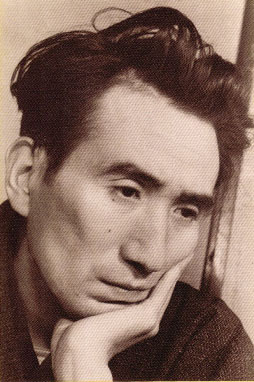Osamu Dazai, a Japanese Rebel With a Cause: A Review of Return to Tsugaru
Osamu Dazai - troubled Japanese genius


Osamu Dazai a Japanese Rebel with a Cause – Review of "Return to Tsugaru"
Osamu Dazai was born in Kanagi, a small town on the Tsugaru Peninsula. Tsugaru is a lesser known region of Japan in the far North West of the main island of Japan (Honshu). Across the Tsugaru Straits is the island of Hokkaido. Traditionally this backwater has maintained its own dialect and traditions and has shunned outside interference. It is a frontier place of harsh weather conditions and frequent crop failures that few people visit.
Forced by financial problems Dazai (Shuji Tsushima) took a commission to undertake a return to his home province to write a travelogue. Typically for the maverick writer whose more famous books tell of despair and self-destruction, Dazai took it upon himself to change his brief from mere recorder of impressions to write a book that touches upon one of the perennial problems of Japan; namely the tension between formality and displays of real affection.
It is the writer’s contention that the people of Tsugaru beset by privations and the further hardships caused by war (Return to Tsugaru was written in 1944) are in some ways ‘oafish’ people with a harsh dialect and brusque manners who are nevertheless sincere folk who show real depths of feeling that supposedly ‘cultured’ Tokyoites would consider unrefined and ‘backward’. This tension between Tokyo urbanity (where Dazai lived) with Tsugaru country brashness is the mainstay of the several comic moments in the book. Dazai, no stranger to excessive alcohol consumption, returns to his homeland determined to avoid indulgent inebriation during times of nationwide rationing. However, as soon as he encounters his old school friends and other old acquaintances he soon drops the affectation of wanting meager fare and cheap rustic cider and is thrown into a whirlwind of sake drinking and overwhelming hospitality that would seem smothering to outsiders but to Dazai typifies the greatness of the locals heartfelt gratitude to be re-united with an old friend.
For Dazai this spontaneity is true feeling and incomparably more real and human than rigid restraints imposed by the thousands of formalities that comprise Japanese ‘polite behaviour’. At one point he returns to his family home and meets his older brother (whom he never liked) and the contrast between his previous wild bouts of late night drinking and arguing about literature are in sharp contrast to the thin insipid dinner chit chat he endures at home.
In some ways Osamu Dazai is that rare creature, a Japanese romantic. He believes in the spontaneous outburst of true emotion. He believes in the inherent nobility of the rustic class just like the British romantics who attacked the staid rigidity of eighteenth century classicism. Dazai has a pop at the meaningless formalities of such ‘traditional’ arts as flower arranging. He contends that flower arranging has become divorced from its roots in nature.
Like all rebels Dazai has many valuable points to make but his position is an extreme one that has never garnered much support in Japan which even today is held together by the propaganda of ‘wa’ (peace) which supports an undemocratic system of patronage and nepotism. And those who seek to undermine his message need only point to his rash and idealistic suicide pact with his then present wife as evidence of his mental instability. Indeed he tried four times before he succeeded in killing himself. On top of that Dazai spent a year as a morphine addict and was nearly imprisoned for being a member of the Japanese Communist Party.
However in “Return to Tsugaru” the tone of the writing is much more light hearted and optimistic then in his more famous books The Setting Sun (1947) and No Longer Human (1948). Unlike these famous novels he reveals a sentimental side as he recounts his fondness for his friends and family in his home prefecture. Dazai changes the real course of events to give the book a comedic structure. The book starts off upbeat then in chapter four there is a set back and the author reaches a low point as he wonders around the town of Fukaura alone before the book builds to a poignant meeting with his former nanny, Take. At the end there is a rare sense of peace that the troubled author had never known before:
I was completely happy. I felt utterly secure…I felt absolutely devoid of cares and worries…Is this the kind of feeling that is meant by “peace”? If it is, I can say that my heart experienced peace then for the first time in my life.
Sadly this peace was not to last for Dazai. He returned to Tokyo and continued his speedy journey to self-destruction, antagonizing the establishment and bringing suffering to all those who tried to love him.
Nevertheless, today Dazai is a feted author in Japan and his books have been translated into several languages. Although few seek to emulate his impetuous, nefarious and addictive version of an artist’s life, many recognize that his message of sincerity and self-expression is the antidote to the straight jacket of Japanese formality.
In the heat of the moment most of us say and do stupid, rash things that we later regret and wish we could retract. The romantic position would be that these rash moments have their roots in truthful, deep emotions. Perhaps that is not always the case. Madness may strike randomly and proves in the light of day to be nothing but madness. Nevertheless it is Dazai’s genius that turns his continued fits of extreme behaviour into a solid body of art whose underlying themes attack a society which deep down knows it must change but which lacks the strength or vision to try.
Mount Iwate in Tsugaru
Movie trailer for (Ningen Shikkaku) "No Longer Human"
Other Reviews of Japanese Literature
- Review of 1Q84 by Haruki Murakami
A review of 1Q84 by Haruki Murakami - Another side of Yasunari Kawabata
Like Dazai, Kawabata killed himself. "The Lake" is a prophetic work that descibes a stalker and social misfit.
Other articles about Japan
- Bamboo Culture in Asia
The origin of the word bamboo is clouded in uncertainty. All we know for certain is that the word first appeared in English in the Sixteenth Century and was brought from Asia by the Portuguese, maybe... - Trippy Traveller in Japan: Teaching in a Japanese Junior High School
- The Convenient Truth About Japan
The Convenient Truth About Japan - Trippy Traveller - The Secret to Corporate Teaching in Japan
Here I am drunk and stoned at 10.30pm, finding new white stuff in my dreads. Its bedtime for me as Ive got to wake up at 6.40am. Im in the middle of my first proper corporate teaching gig. Ive...





